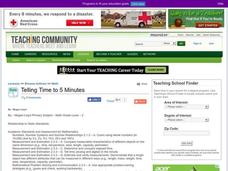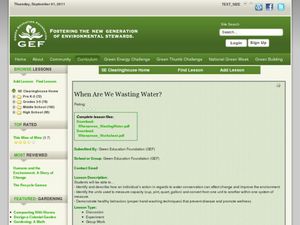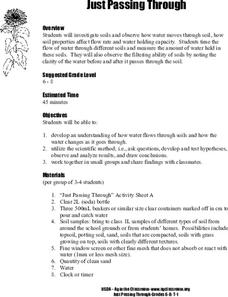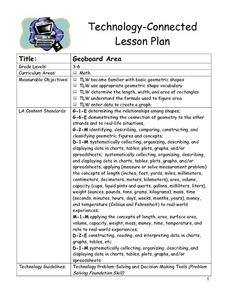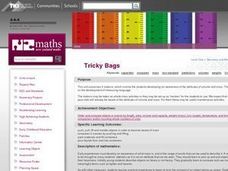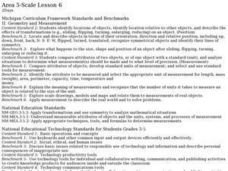Curated OER
Metric Conversion
Fifth graders access prior knowledge to complete a do now using metric conversion. For this metric conversion lesson, 5th graders will respond to problems and analyze for a possible mnemonic device.
Curated OER
Telling Time to 5 Minutes
In this second grade lesson your class will practice telling time. The goal is to tell time to five minutes using an analog clock. Your young students count by 5 minute intervals and discuss elapsed time.
Curated OER
Tick Around the Clock
Learners examine and discuss the differences between clocks they are shown. Using the internet, they research how people used to tell time before clocks. They review what the long and short hand on the clock represent and practice...
Curated OER
Box and Whiskers
Middle schoolers discover how to relate collected data with a box and whiskers graph in a number of formats. They collect, organize, create, and interpret a box and whiskers graph. Pupils interpret the difference between sets of data,...
Curated OER
Water Monitoring Vocabulary
As the title implies, this is a list of vocabulary terms relating to water monitoring. If your ecology class is learning about how to test water quality, this will be an appropriate reference sheet for them. As a bonus, if you live in...
Curated OER
Economics Quiz
Let your scholars test their economics skills with this 55-question quiz! They respond to fill-in-the-blank and multiple-choice questions pertaining to the study of microeconomics and macroeconomics. All answers are provided, and the...
Curated OER
Maps and Modes, Finding a Mean Home on the Range
Fifth graders investigate data from maps to solve problems. In this data lesson, 5th graders study maps and collect data from each map. Students present their data in a variety of ways and calculate the mode, mean, median, and range.
Curated OER
Money in Action
Students become familiar with the various coins in our money system as well as amount of each coin. They help develop their ability to count change and find different ways to show equal amounts.
Curated OER
When Are We Wasting Water
Students study water conservation. In this water conservation instructional activity, students participate in a water conservation experiment. Students discover how to conserve water while washing their hands.
Curated OER
Just Passing Through
Students explore how water moves through soil. They experiment with different soil types and record their findings.
Curated OER
Paws in Jobland Number Crunch
Learners analyze real life jobs that involve math. They discuss jobs where math is used, and explore how math is important in many areas and research some of these jobs in the book "Paws in Jobland." They complete a worksheet with four...
Curated OER
Cylinder Volume Lesson Plan
Tenth graders define the formula for cylinders and use it to solve real world problems. In this geometry lesson, pupils differentiate between area, perimeters, 2D shapes, 3D shapes, and volume of prisms, cylinders and spheres. They...
Illustrative Mathematics
Words and Music I
What type of music is best to listen to while learning? In a short writing prompt, learners must determine if a scenario involving listening to music while memorizing material is an experiment or an observational study. The prompt also...
Curated OER
Respiratory System
In this health worksheet, middle schoolers examine the human body and make mental connections to the target function highlighted in the sheet.
Pennsylvania Department of Education
Volume of Compound Figures
Fifth graders use patterns, models and relationships to solve equations. In this equations lesson, 5th graders define vocabulary for equations and complete worksheets explaining variables and solving problems.
Curated OER
Geoboard Area
Students explore the basic geometric shapes and geometric shape vocabulary through the use of geoboards and virtual geoboards. They create a variety of shapes with a partner, build ten different rectangles on their geoboards, and...
Curated OER
Volume and Mass: Identify the Attribute
Students rotate through five studying stations related to the attributes of volume and mass. They manipulate objects to explore mass, compare two masses by pushing and lifting, pack materials and fill containers, and pour liquids from...
Curated OER
Scaled Rubber Band Drawings
Learners demonstrate the process of creating a scaled rubber band enlargement of a simple drawing. They observe and discuss a teacher-led demonstration, and create a scaled rubber band enlargement of simple drawings and their invention...
Pennsylvania Department of Education
Volume of Regular and Irregular Objects
Fifth graders examine patterns and relate to equations to solve math problems. In this patterns lesson, 5th graders diagram, graph, use models and use tables to solve equations for real world problems.
Curated OER
Making Benchmards--Length
Students explore the idea of having Benchmarks to estimate the length of given objects. Students demonstrate acquired knowledge of the basic units of length by making reasonable estimates. Students create a personal benchmark.
Curated OER
Exploring Area and Perimeter
Two young scholars are blindfolded and each receives a cardboard square, one with pompoms glued around the edge and one with pompoms glued all over the surface. They identify what they feel. The class discusses perimeter and area of...
Curated OER
Making It Balance
Students listen to story, "The 100-Pound Problem," compare their weight with character in story, and weigh different classroom items using nonstandard units and standard units. They experiment with different items that can make scale...
Curated OER
Scaling Our School
Fourth graders practice estimating the length and height of buildings at their school. They then compare their estimations with the actual heights or lengths. Each student then builds a scale model using ratio to translate the "real"...



